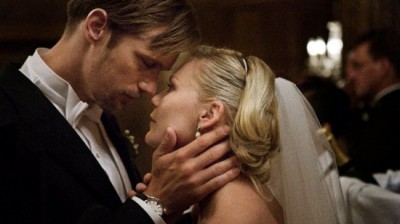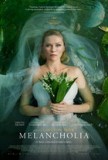| Reviews & Columns |
|
Reviews DVD TV on DVD Blu-ray 4K UHD International DVDs In Theaters Reviews by Studio Video Games Features Collector Series DVDs Easter Egg Database Interviews DVD Talk Radio Feature Articles Columns Anime Talk DVD Savant Horror DVDs The M.O.D. Squad Art House HD Talk Silent DVD
|
DVD Talk Forum |
|
|
| Resources |
|
DVD Price Search Customer Service #'s RCE Info Links |
|
Columns
|
|
|
Melancholia

Reviewed at the 2011 New York Film Festival
Melancholia opens with a series of painterly images, accompanied by Wagner and presented in agonizingly slow motion. That presentation gives the otherwise befuddling images a weight and significance that we don't fully grasp--except for the final one, which encompasses nothing less than the end of the world. Put on your clown noses, kids, it's a new Lars von Trier movie!
We go back. "Part 1: Justine." It is wedding day for Justine (Kirsten Dunst) and Michael (Alexander Skarsgård), and a good hour or so is spent on their reception, thrown by her sister Claire (Charlotte Gainsbourg) and brother-in-law John (Kiefer Sutherland) at their giant country estate (which includes, John never tires of saying, an 18-hole golf course). The sequence begins with more warmth and humor than we've come to expect from the filmmaker, but by taking his time and letting first act unfoldly slowly, von Trier subtly fades that warmth away and gives us a clearer impression of exactly who these people are.
When we first meet Justine, she is all sunny smiles and soft kisses, but the more time we spend with her, the more we see that she is a total mess--so deeply, presumably clinically depressed that she is unable to even keep it together for her own reception. She's prone to moodiness and despondence; she disappears for long stretches, leaving the guests standing around awkwardly, waiting for her to return. "Is everybody in your family stark raving mad?" John asks, and not unreasonably--by that point, they've all shifted uncomfortably through just about the worst wedding toast you've ever heard, courtesy of mother Gaby (Charlotte Rampling). "I hate marriage," Gaby announces. "Enjoy it while it lasts!"
In a nice touch, von Trier lets us put together how Justine both needs her mother, who is perhaps the only person she can speak freely to, and is ultimately done unceasing damage by the older woman's enabling. These are the kind of murky psychological waters the filmmaker is treading into in this long and fraught sequence, which captures vividly the hopelessness and despair of trying to get through to someone who is, well, filled with hopelessness and despair.
"What did you expect?" asks Justine of her beau, and miraculously, her face transforms; she suddenly looks as old as she feels, weathered and beaten, all but destroyed. (Dunst won a richly-deserved Best Actress award at this year's Cannes Film Festival; it's a peerless piece of work.) That's just a warm-up for the second half of the film ("Part 2: Claire"), which finders her debilitated--almost paralyzed--by her sickness. We are now in the days after the reception, and the focus is on an event causally mentioned there: an approaching planet, which all scientists of note are proclaiming will pass by the earth, and will not (as those cranks on the internet insist) collide with it.
And so an intriguing question is asked: what happens when someone who treats everything like it's the end of the world is faced with the literal end of the world? What's more, what happens to the support network that keeps her calm and collected?
Much of this is quite uncomfortable to watch--not squirm-inducing, like Antichrist (get out of my brain, scissor scene), just unsettling, awkward, and frankly riveting. The latter quality is particularly impressive, considering that von Trier has already given up the game in that opening sequence (and doesn't cop out on it). Some might question that decision, but it's a wise one. We know right from the jump that anything goes.
The closing passages, dealing with the approach of Melancholia, are anxious, convincing, unnerving cinema, made all the more potent by von Trier's efficient direction. He doesn't push, steering clear of stock effects and stingy music cues (there's no score at all, just a couple of well-chosen Wagner excerpts). This is an infinitely confident filmmaker. His instincts occasionally fail him; a few of his beats--particularly those involving Justine's boss (Stellan Skarsgård) and his new underling (Brady Corbet)--fall flat, and the array of divergent accents within the same family is an occasional distraction. These are minor concerns, as are the filmmaker's off-screen antics. Yes, he's a pain in the ass. He also remains a major talent, and Melancholia is his best work in a decade.
Jason lives in New York. He holds an MA in Cultural Reporting and Criticism from NYU.
|
| Popular Reviews |
| Sponsored Links |
|
|
| Sponsored Links |
|
|
| Release List | Reviews | Shop | Newsletter | Forum | DVD Giveaways | Blu-Ray | Advertise |
|
Copyright 2024 DVDTalk.com All Rights Reserved. Legal Info, Privacy Policy, Terms of Use,
Manage Preferences,
Your Privacy Choices | |||||||










